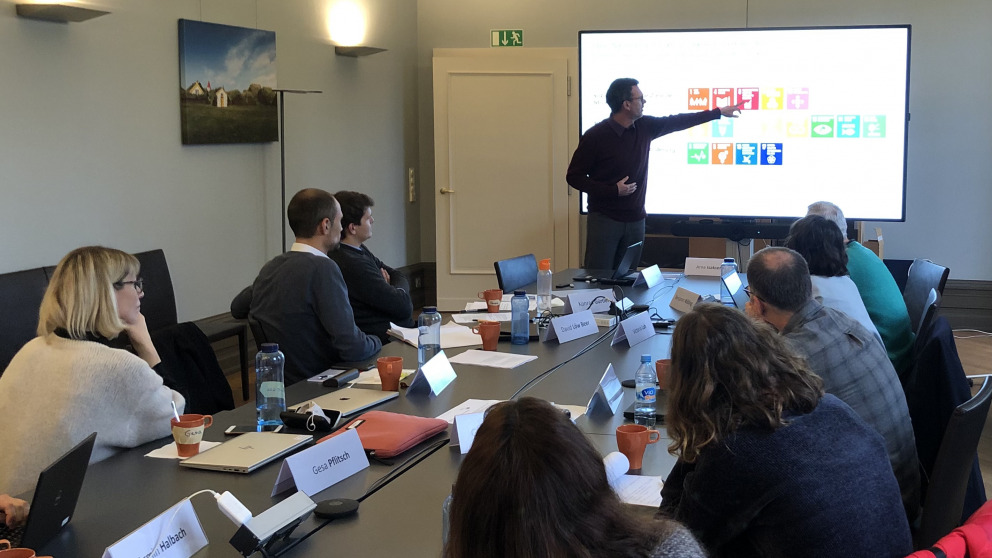Interdisciplinary Perspectives on Transformations Towards Sustainability at the Regional Level
06.12.2022

Transformations towards sustainability need change at all levels. It takes people who have the courage to embrace goals and are empowered to pursue them. We need pioneers and projects that show that sustainable change and lifestyles are possible. And we need targets and incentives to help ensure that transformations are broad-based and lasting. One aspect that is rarely considered is the role that regions play in sustainability transformations. This was the focus of the workshop "Transformations towards sustainability at the regional level" on 25.11.2022 at the IASS in Potsdam. In particular, the workshop cast a spotlight on regions that are or were dependent on fossil fuels or energy-intensive industries.
Regions are political or geographic areas that encompass more than one local unit, but not an entire nation state. Their affiliations and identity(ies) are often contested – both politically and socially. In recent decades, policymakers and economic development agencies in particular have increasingly focused their efforts on regions, as they are often thought to be of an appropriate scale for programmes of economic and cultural revitalization and change. Participants at the workshop explored the suitability of various methods for examining change processes at the regional level, the relevance of insights gained from other levels and contexts, and overarching patterns that emerge from the examination of individual transformations.
In the opening presentation, Arne Isaksen (University of Agder, Norway) considered regional innovation systems and their increasing focus on contemporary challenges such as climate change. Isaksen basically distinguished between two strategies: Reorientation aided by existing actors and structures and transformation as a process of radical change aided by "new" actors in affected regions. As he showed, the expedience of each strategy varies depending on the specific challenge.
Following this presentation, which focused on entrepreneurial action, David Löw Beer and Konrad Gürtler (both IASS Potsdam) looked at the role of political action in regional governance processes. Taking the transformation of the former mining district of Lusatia in Brandenburg as an example, they investigated the role of sustainability goals in the selection of projects and the sustainability concepts pursued by various actors. Their case study highlighted the tensions at work in regional transformation processes negotiated between state and local stakeholders and the role of new actors.
Gesa Pflitsch (Western Norway University of Applied Sciences) focused on the role of networks in driving regional transformations toward sustainability. Applying her methodological approach of transition topology to sustainability networks in the city of Augsburg, she revealed critical junctions in the city’s development, such as the founding or restructuring of an organization and the impact of these changes on other organizations.
Drawing on examples from rural communities in Brandenburg, Benjamin Nölting (University for Sustainable Development, Eberswalde) discussed some key issues around regional sustainability transformations: Can regional development respond to the macro challenges of our time and how do micro and macro developments relate to each other? Should regional transformation processes play to local strengths or tackle sustainability problems? Are actor networks, resources, or social innovations the key drivers of regional change? Or should we be focussing on shared visions?
Franziska Görmar (Leibniz Institute for Regional Geography, Leipzig) took a closer look at the role of visions and outlined the findings of her research on the role of identities, narratives and imaginaries in shaping the direction, depth, and speed of regional transformations in post-industrial regions in eastern Germany, including the towns of Zeitz and Lauchhammer.
Peter Eckersley (Nottingham Trent University and IRS Erkner) examined factors that influence sustainability transformations, particularly in urban areas. According to Eckersley, regional transformations are often challenged by the uneven availability of policy instruments, as regional boundaries frequently do not align with administrative jurisdictions. In addition, the choice of policy instruments can also depend on regional factors such as the level of popular support or effectiveness.
At the end of the workshop, Timon Wehnert (Wuppertal Institute for Climate, Environment, Energy) looked again at the role of sustainability goals in coal-mining regions. His presentation discussed concrete strategies for anchoring sustainability criteria in the allocation of structural funding. These insights were coupled with examples of good practice at national and international levels. Wehnert’s presentation highlighted the fact that little has been done to operationalize sustainable development goals within the context of structural transformation processes in Germany’s lignite mining regions and that their impact has been minimal as a result.
Following the workshop, the participants discussed which academic and policy issues are of particular importance with regard to regional transformations. It was evident that many of those attending will continue to grapple with questions relating to practical aspects of the sustainable development goals and their operationalization as well as the drivers and barriers to their implementation. The discussion also touched on the subject of dealing with actors who are reluctant or even hostile towards sustainability transformations. The participants also noted the difficulty of balancing different sustainability goals and the risk of marginalizing environmental issues or narrowing the focus of social issues to single aspects such as protecting jobs. Comparisons between different regions in Germany and abroad would likely prove to be particularly informative. And, finally, the participants discussed how insights gained from the governance of regional transformations can be incorporated into the design of future processes.

